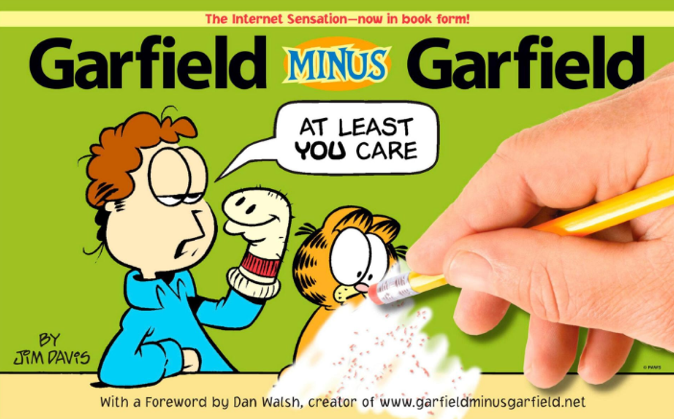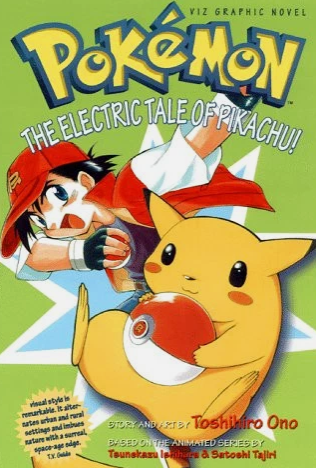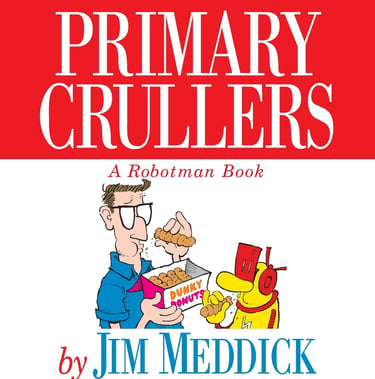

Exploring the weirdly obscure of Comics' best!


Yokohama's Kaidashi Kikou
Restoring the human spirit in mankind's twilight hours.
Superman Adventures
Reviewing the first ten issues of the best Superman series no one took seriously.




Superman Adventures #1 - Men of Steel
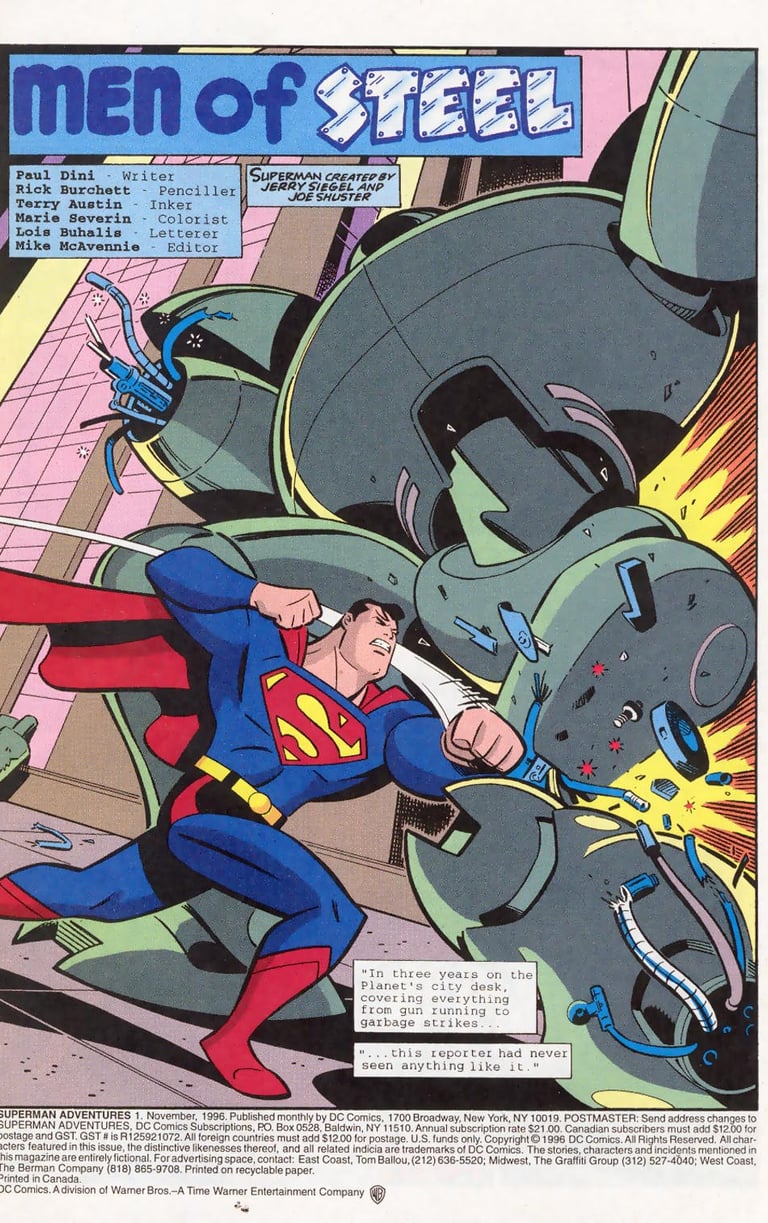

Issue #1's first page opener - a recount of Supe's battle with the Lexo-Skel 5000 from the animated series.
Issue #1 dovetails nicely with the cartoon’s three-episode opener that saw Clark Kent come to Metropolis, don the “Superman” persona, and have a climactic battle with Lex Luthor’s creation—the mechanized “Lexo-Skel 5000” war machine. The comic begins in the aftermath of these events, with Luthor studying the data gleaned from the confrontation and then developing his own “Superman,” an android meant to mimic the Man-of-Steel’s likeness and numerous uber-abilities. The purpose? To assassinate the alien, of course, but not before razing a foreign embassy and framing him for the attack. Destroy the man’s reputation, then destroy the man. Capeesh?
The story here is Paul Dini’s one and only contribution to the series. Already a head writer for the TV canon, he’s more a figurehead here, existing only to set the comic’s tone and flow to the cartoon show before making his exit. Later writers would stretch the fabric of what was possible in this odd pocket-subset of the animated universe, but Dini’s purpose is not to test the boundaries. Only lay them.
Which makes this a merely sufficient entryway into the series. It’s fun, no doubt, offering some interesting asides into Clark’s home and work life before letting the action take over. The art is especially wonderful: although inescapably cartoony, penciller Rick Burchett captures the show’s minimalist aesthetic with finesse while still lending his distinctive touches through primo paneling and framing. Terry Austin and Marie Severin, as inker and colorist respectively, enrichen those excellent sketches further with their sparse, clever uses of light, hue, and shadow. All combined, the three offer a captivating take on a city already depicted countless times before. This Metropolis, with its avant-garde sensibilities and futurist architecture, might be the definitive city of any version. (Fleischer Studios would be proud.)
Superman Adventures #1 is a good establishing shot for what’s to come. And it gets only better from here.--D
Thanks to viewcomiconline.com for the image!


Superman Adventures #2 -
Be Careful What You Wish For
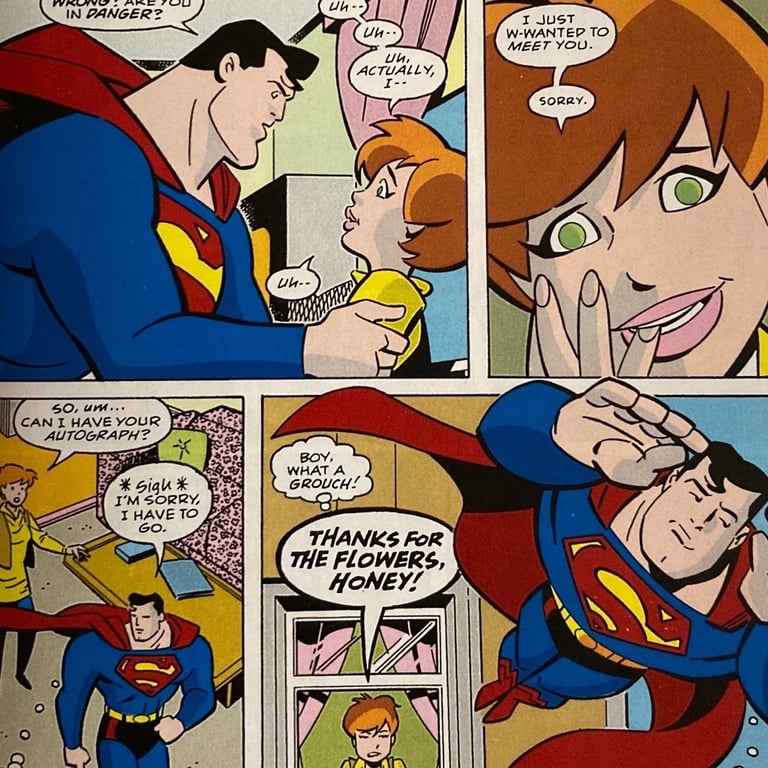

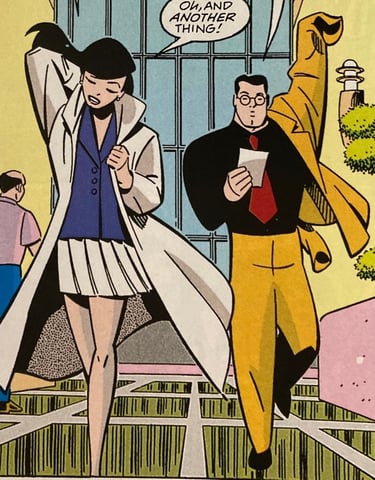

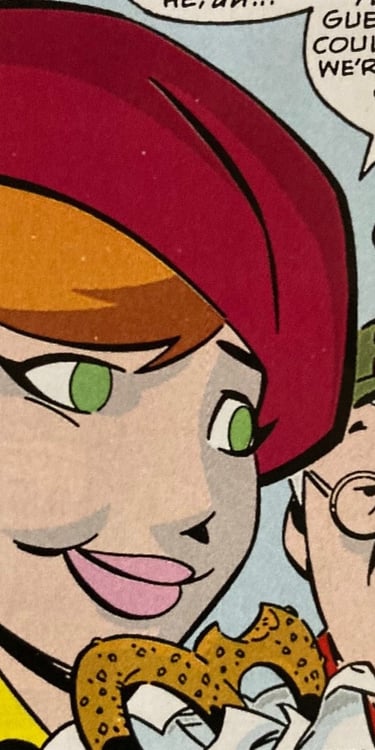

Above: On display is Kelly (the cute red-head) who perfectly represents Burchett's talent in evoking emotion on the page, no matter how effusive or unassuming. Likewise, the panel in which Lois and Clark throw on their coats might seem a throwaway scene, but Burchett uses the moment to compare a glimpse of Lois' feminine grace to Clark's stiffer, almost artless demeanor.
Scott McCloud takes over the writing for an issue #2 winning debut, crafting a good-natured tale around one of the incidental drawbacks that come with being a superhero. Female infatuation.
Indeed, now that everyone knows Superman is a real being—and a handsome one at that—what’s stopping any lonely woman from simply shouting “Superman, help!” whenever she sees him swoop by? And that’s exactly what happens here: Young Kelly, spotting the godly stud flying overhead, calls to him for help. Superman obliges only to find that he’s fallen for a new kind of trap—one of female opportunism. To his credit, Supes handles the encounter gracefully enough and simply flies off, leaving the girl dejected and displeased, but…why should he reward her bad behavior?
Of course, this doesn’t stop Kelly from bragging to a pretzel vendor that Superman’s now her boyfriend—a conversation which Metallo, a kryptonite-powered cyborg introduced early in the TV show (episode 7!), conveniently overhears. Naturally, he nabs the girl in hopes of dragging Superman into his own kind of trap...one that soon devolves into an exchange of fisticuffs between the two super beings. McCloud’s chief point of concern, however, is not the battle. It's Kelly. Does she learn her lesson in the end? Perhaps her normally uneventful life now doesn’t seem so bad?
Rick Burchett, as always, delivers some excellent pencils that are further enhanced by his team’s excellent inking and coloring skills. As seen in even the simplest movements, from Kelly munching a pretzel to Clark yanking on his blazer, Burchett excels at rendering motion. In fact, his overall style is a perfect counterpoint to the heavy realism or manga stylings that comprise most mainstream Superhero fare. In fact, Burchett's art is an equally effective, Western-equivalent to the now tropish anime aesthetic seen absolutely available. It's a fine, "American" alternative. --D


Superman Adventures #3 - Distant Thunder
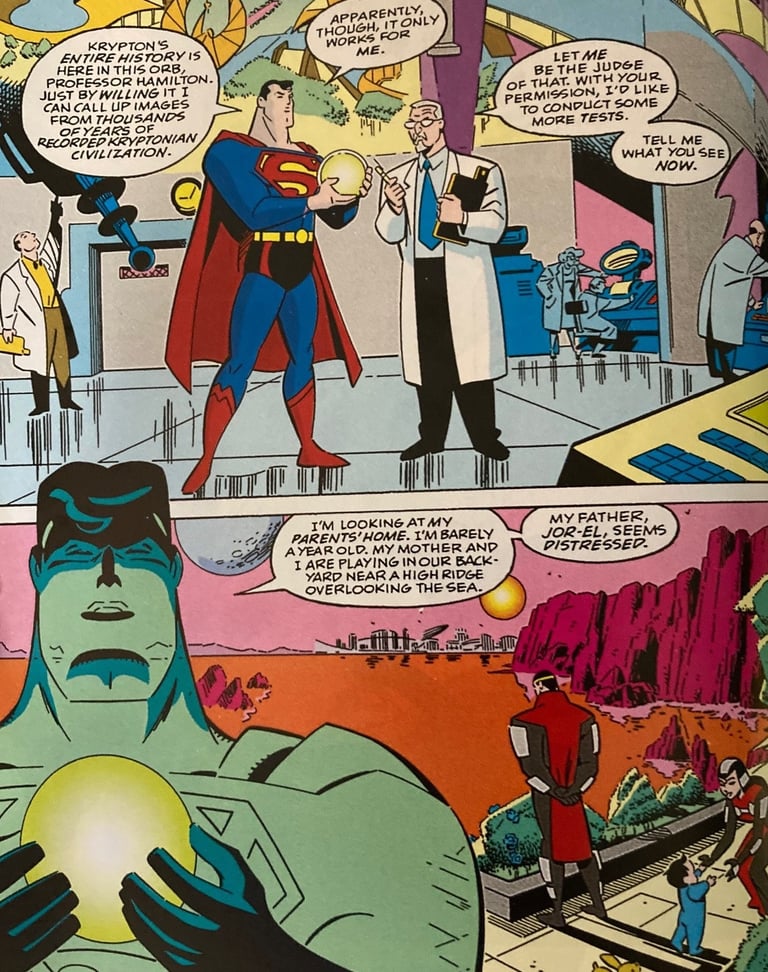

Penciller Rick Burchett, per his usual splendor, crafts a well-staged living reverie of Krypton's final days.
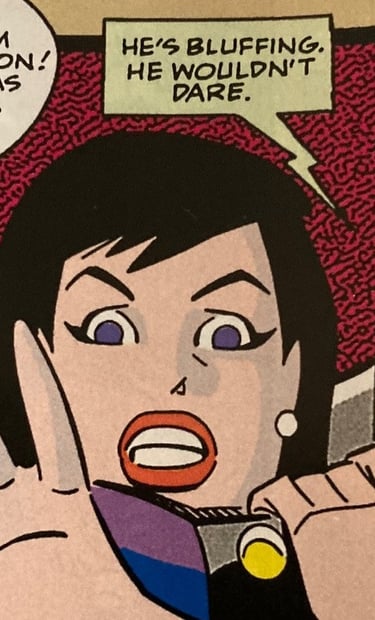

Above and below, Lois' range of expressions is fantastic.
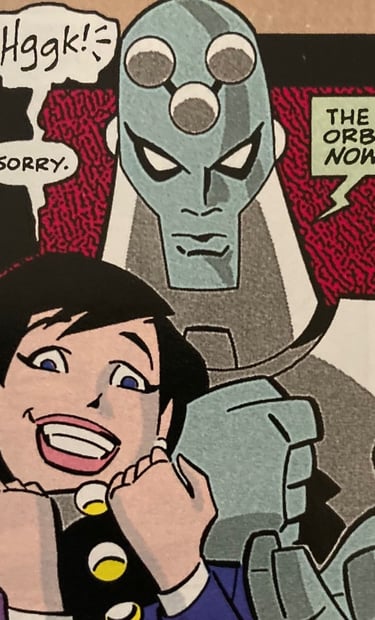

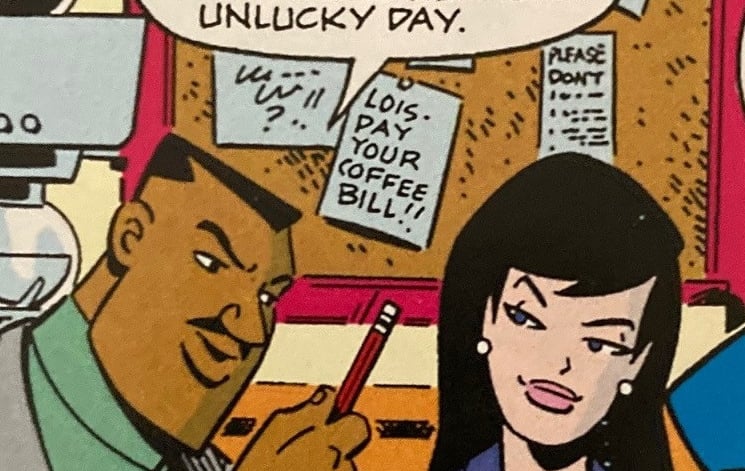

Note the "Lois-Pay Your Coffee Bill!!" gag in the background. The text, due to its increased definition, appears to be a late insertion. A last-minute pun courtesy of letterer Lois Buhalis?
Issue #3 brings a fantastical, fleeting peek at Kryptonian life and history; Superman, by accessing an archival orb that stores his people’s collective memories, gets to witness, as if firsthand, the last days of his doomed race. It’s a somber moment made more bittersweet when he stares into the Earth’s night-time sky, eying his dead homeworld still shining overhead—but not for long. Soon, the flash of Krypton’s explosion from twenty-seven light years away will reach the planet, promising poor Superman yet another grim vision.
It’s a sober prelude to the surreal morning that follows; black cats are everywhere, surrounding the Daily Planet and filling the streets. Clark’s coworkers have their fun with the bad luck jokes but, once one of these little kitties incinerates a car just by looking at it, Superman knows there’s more than silly superstition at play. Brainiac, the rogue AI that helped bring Krypton’s demise, is back. And looking for him.
Or rather, he’s looking for the orb, that receptacle of all Kryptonian knowledge. And when he snatches Lois, the android seems to have the upperhand—it’s the globe for the girl. But Superman has another idea. Rather than give into the villain’s demand or, worse, simply sacrifice Lois in the name of historic preservation, the hero does the opposite. He threatens to destroy the globe.
It’s a simple story, but one bookended with a poignant beginning and a powerful climax. Superman, by choosing Lois over his own heritage, has made a profound declaration of public, psychological, and prophetic importance. Earth is his home, and its every individual more precious to him than a trillion Kryptonian memories. It’s a god denying heaven to serve the squalor.
In that moment, Superman becomes more than a hero. He becomes Earth’s champion. And maybe, its savior.--D


Superman Adventures #4 - Eye to Eye
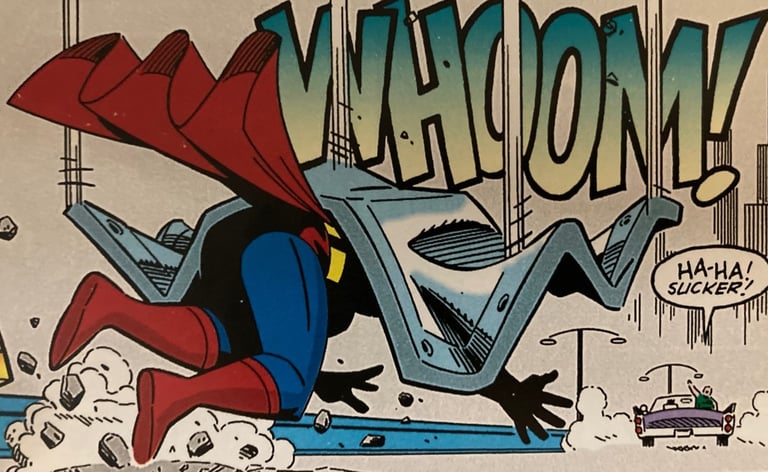

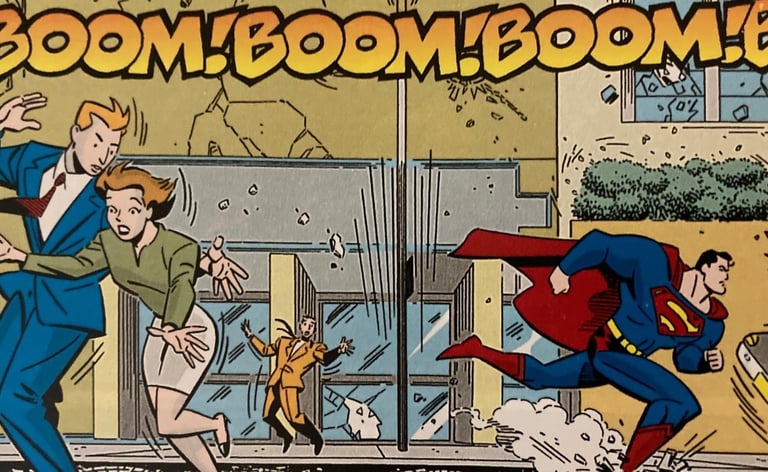

Rick Burchett deftly presents Superman's crunchy run through Metropolis.
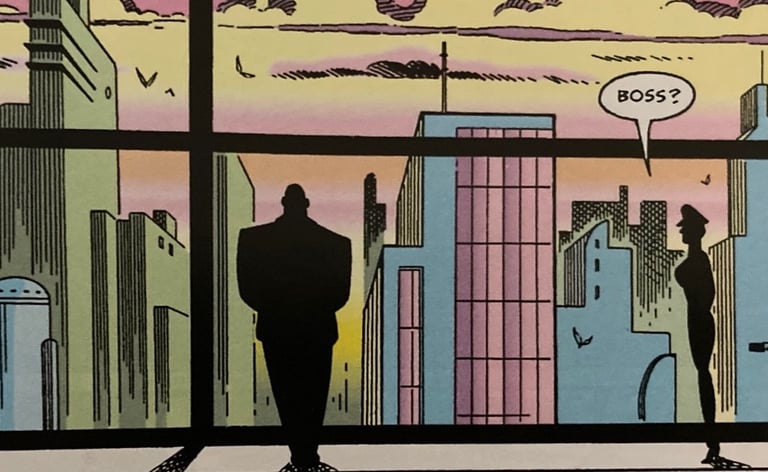

Although the colors don't pop here like they do on the printed page, colorist Marie Severin deserves kudos for the smart pastels she often uses to evoke certain moods, themes, and settings.
From a writer’s standpoint, constructing fresh stories around an individual who can do anything is a tricky exercise. But what’s tougher still? Properly portraying the man’s supporting cast. Clark Kent has an extensive entourage of family, friends, and co-workers, but only Lois is regularly emphasized; characters like Angela Chen and Perry White are usually reduced to window-dressing or background filler. It’s even the same for Jimmy Olsen; Superman’s “best friend” rarely transcends tagalong status where he’s left to snap photos from the sidelines.
But not this time. The story begins with Perry lecturing Jimmy about the pictures he took of Superman’s fight with Brainiac. Although competently taken, the chief expects Jimmy to capture the real grit of the scene—to get close where the danger is real. Afterward, Jimmy sighs and wishes he could be brave like Superman, to which Clark uses some syllogistic logic to extol the story’s moral: Courage requires facing one’s fears. An invincible man has no fears. Therefore, Superman isn’t brave.
And that’s the early highlight of a story that becomes little more than an entertaining car chase through Metropolis. After getting zapped by some crooks with a stolen gravity ray, Superman now weighs a megaton. But that doesn’t stop him from quaking his way after the thieves anyway, leaving a nice trail of potholes as he follows their speeding car through town. The crunch, thud, and shudder of the hero’s now seismic strides are well captured by Burchett, making one wonder just how much property damage Superman has wrought with this single apprehension. Of course, Jimmy risks his life tailing the whole affair, finally capturing the perfect precarious shot.
It’s a fun if inconsequential story, one sadly befitting a supporting character often relegated to afterthought. As a photographer, Jimmy must always keep his subject in focus and in frame. Pity, then, that the stories doesn't always do the same for him.--D


Superman Adventures #5 - Balance of Power
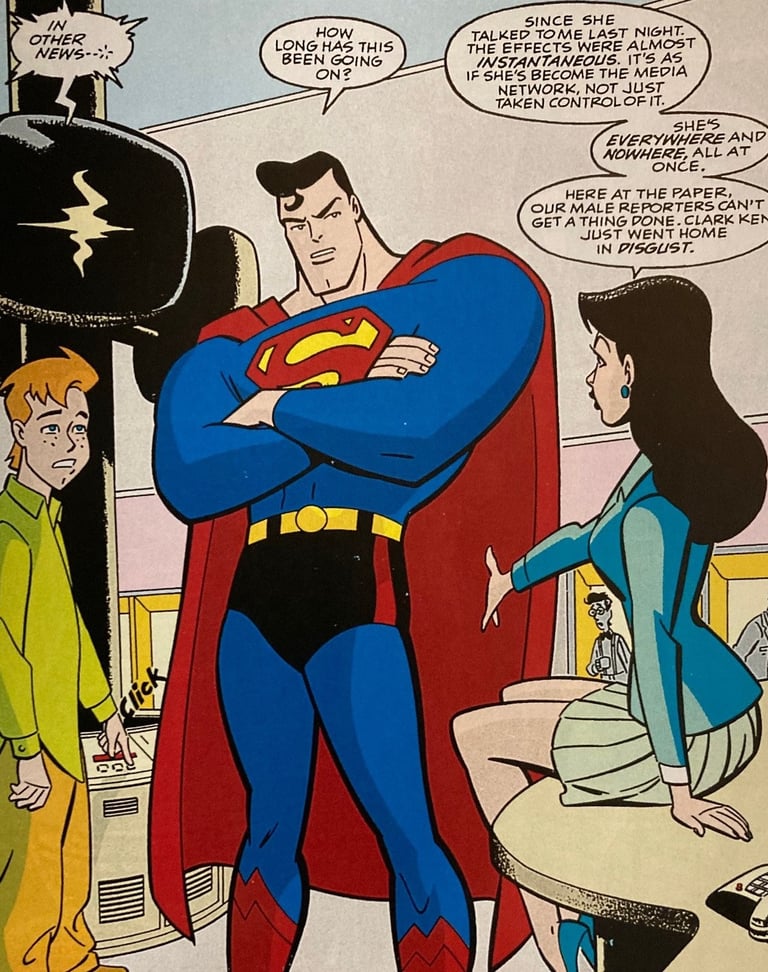

Penciller Bret Blevins does a respectable job, but filling in for Rick Burchett would be an unenviable task for anyone.
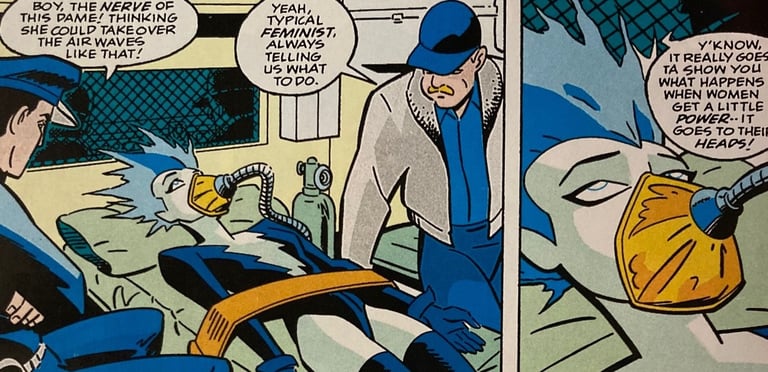

Not just the first page, but the first panel, sets the excessive tone to follow.
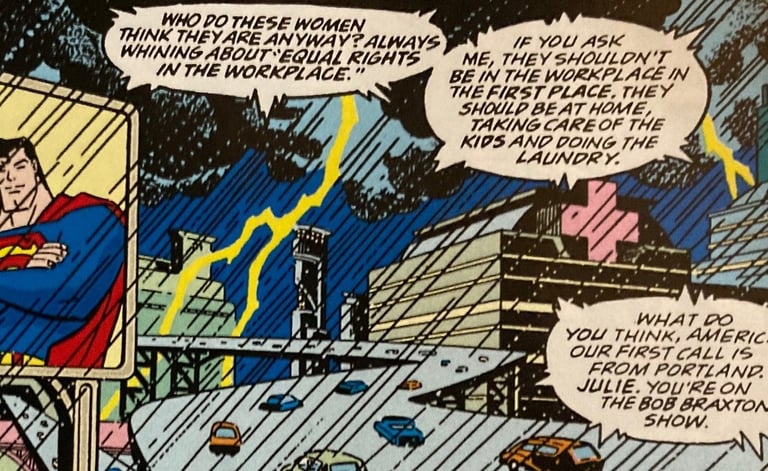

Likewise, as if the message hadn't already been laid and pounded several times over, even the final scene's life-saving medics can't help but spout some sexist rhetoric.
“Balance of Power,” as the title implies, takes a left-handed swing at politics with a rather heavy-handed attack on male chauvinism. On the opening page, the supervillain Livewire lies comatose as a radio blares in the background. No, it’s not calm, nurturing music coming through the speakers, but a caustic talk show host complaining about women “…always whining about ‘equal rights in the workplace.’” And thus, the tone and stage is soundly set—this is a story that attacks men who attack female ambition.
And, if taken seriously, the issue does paint a bleak picture—the men here do bear a sudden and surprising sexist streak, almost vindicating Livewire’s self-resuscitation and feminist binge. Her scheme? Being composed of pure, electrical energy, she promptly disrupts all media broadcasts, allowing only female-hosted content to air. In other words, now men are the marginalized party, able to only watch from the back as women cover the news, whether via newspaper, radio, Internet, or television. How Livewire’s powers give her the kind of ubiquity and omniscience to, say, delete every male reporter’s word processor document when he attempts to save is never explained. How she deals with all the cameramen, male producers, executives, technicians, and whatnot responsible for getting those women on the air is never shown, either.
Nevertheless, it’s still a promising premise foiled mainly by a middling ending; it’s actually one of Lex Luthor’s inventions that magically stops the shocker. While Superman acts as the distraction, Lex takes the winning zap, neutralizing the villain and swiftly concluding the story. But not before the female onlookers walk away deflated and dejected…and even Superman spares a look of unease.
But though the ending is a bit listless, the “message” poses its own problems, expressed at least a decade too late by 1997. A 1970s newsroom may have suffered the kind of patriarchal pride as criticized here, but by the end of the 20th century, broadcasting was one of the most progressive professions available—especially for women. The overly blunt, on-the-nose approach of said message also doesn’t help—no matter how valid or well-intended the overall moral might be, its exaggerated delivery strains any credibility…like a salesman trying too hard to sell an obsolete computer. It’s a cliché— an easy crutch—that ultimately doesn’t say much.
And sadly, even the art slightly disappoints; Bret Blevins has pencil duties for this issue, and although his work is certainly competent, he can’t quite reproduce Rick Burchett’s (or the TV show’s) bold strokes and sense of presence.
Sadly, issue five is an odd anomaly. Although still worth a read, it doesn’t align well with the other stories, feeling better suited, really, for a different series. It’s certainly the weakest of these.--D


Superman Adventures #6 - Seonimod
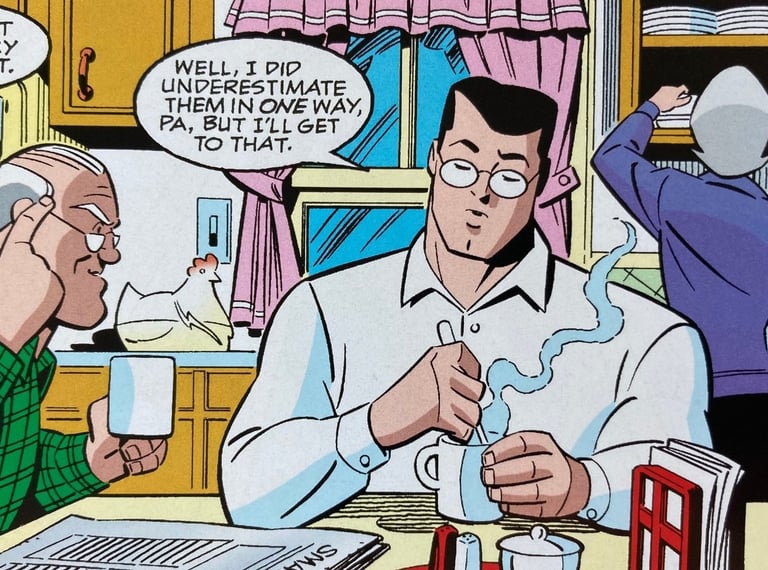

The story is also creatively staged via Clark's recounting of the bizarre events to his parents.
Old-timers of the comic book hobby often wax nostalgic about the medium’s Silver Age, an era in which superhero fare was more whimsy than grit, more grins than growls. Stories that were less grounded in reality and more bound to the stars—reality at odds with the gods. By 1997, much of this unharnessed restraint had been successfully tamed in the name of greater “believability.” Because, naturally, stories about flying men with x-ray vision needed to be more realistic.
Not all stories were scrutinized equally, however, nor held to the same “standards.” And the advantage of Superman Adventures, being a series based on a “silly” cartoon versus a “serious” book, meant creative writers like Scott McCloud had more room to maneuver, side-stepping the typical rules to bring sheer incredulity to the page. The result is a story like this one, in which Superman finds himself gazing upon a decimated Metropolis. Everything is in ruin, burning and smoldering as if the city’s been hollowed out by a nuclear bomb…and then he sees her, Lois, lying motionless in the rubble. But before Superman can consider the worst—to truly scream—her eyes open and she begins hovering upward. Up, up, and away she rises, toward a shattered Daily Planet that’s reforming as she’s floating, caught in a sort of self-restoring implosion. The whole city’s doing the same—every explosion, every building, contracting back to their original forms. But as Superman watches, Mr. Mxyzptlk, the mischievous imp from the 5th dimension, watches him. And then he offers an important clue.
“Seonimod” is a fever dream. A flashback. A time-traveling fantasy. A mystery born of a nightmare…one in which Superman, the world’s greatest hero, might still be unable to solve. But above all, it’s the perfect fable of mind versus might, of using one’s brain when brawn isn’t enough. Anyone who mistakenly thinks Superman is nothing but dumb muscle need only read this.
On his website, Scott McCloud claims this as his best Superman piece. When combined with Rick Burchett’s excellent pencils, he might just be right. It’s “silly” Silver Age storytelling recrafted for modern, “sophisticated” audiences.
So, no need to explain more; go find a copy. One is readily available here.--D
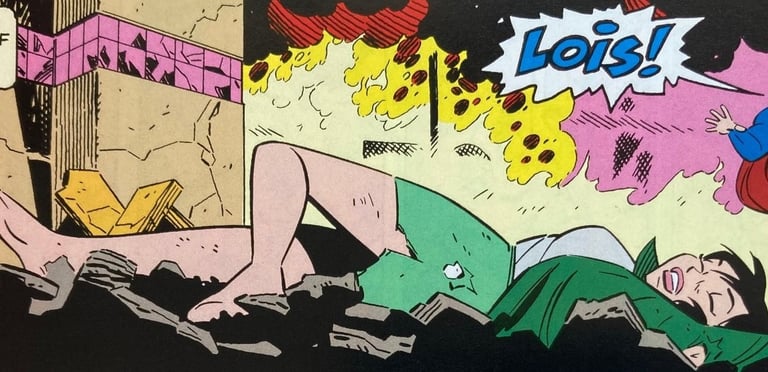

It's a grim scene, but then the impossible begins to happen...
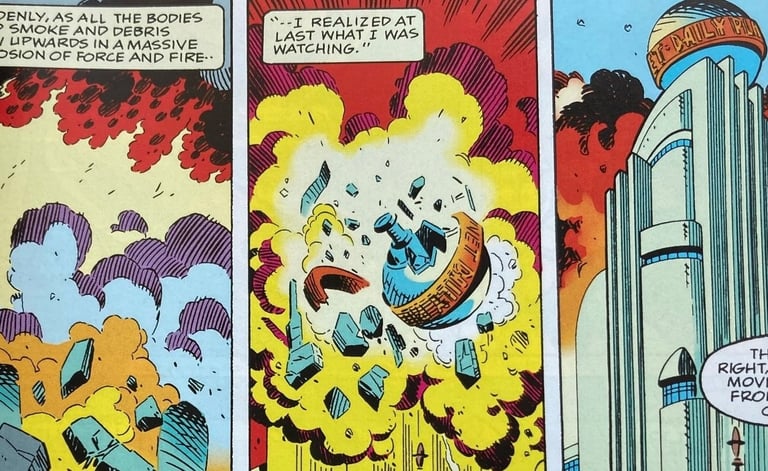

....everything begins to flow in reverse, as if being rewound to an earlier time. Superman has a 5th-dimensional enigma on his hands.


Superman Adventures #7 - All Creatures Great and Small
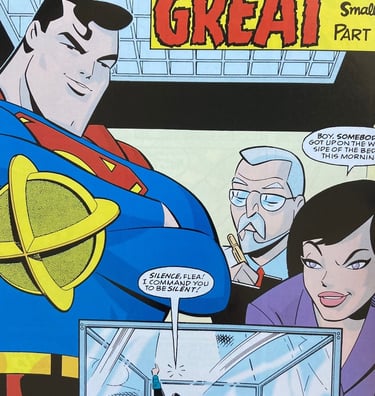

The premise seems like a disaster waiting to happen--and yep, so it is. The story is so much fun, though, the outlandishness is quickly forgiven.
Speaking of whimsy—if last issue’s time-travelling gymnastics weren’t surreal enough, this tale is happy to try again. It begins with a miniaturized Jax-Ur and Mala—rough approximations of General Zod and Ursa from the film Superman 2—contained in a kind of sealed terrarium designed by Star Labs. Per the animated series, these two Kryptonian criminals were banished to the ghastly Phantom Zone for their dastardly misdeeds, only to escape years later for an attempted conquest of Earth. Through great effort, Superman managed to banish them back, but leaving anyone in a tortuous nightmare world isn’t really the “Superman Way.” So his solution is this, using Star Lab’s “Molecular Scaling Generator” to keep the two tyrants tiny, helpless, and trapped…but within far nicer accommodations. It’s an idea so crazy, it might just work!
But of course, it doesn’t.
The two criminals eventually escape, first powering up via the sun, then turning the same shrink ray on Superman, literally cutting him down to action-figure size. The story culminates in an outlandish battle inside poor Lois’ apartment before her ceiling is peeled away like the lid off a can, the titanic face of Jax-Ur peering maliciously inside. Yes, he’s used the Generator to increase his size a hundred times over. And how does anyone stop a 150-foot tall Kryptonian? Issue 8 holds the answer.
First, this isn’t a great story. It follows (consciously or not) the tropes already plenty explored by Honey, I Shrunk the Kids and similar cheese. That said, it is extremely polished, well-staged, and just pure fun, a Superman comic written and drawn with Looney Tunes sensibilities. McCloud understands the absurd corner he’s written himself into, embellishing everything with a Silver Age silliness too charming to seriously criticize.
But the real hero of this issue is artist Rick Burchett—his minimalist, stylized approach fits the action and antics perfectly here, capturing the nigh-cartoon lunacy such a premise affords. His sense of scale, perspective, and exaggerated proportion are depicted with a pronounced prestige and presence throughout. It’s Lois, however, who’s the real standout; she’s never been as expressive, as humanly exuberant in both her triumphs and resigned dismay, as in this utterly bonkers comedy of errors. This is Lois at her most winsome, empathetic best.
And hopefully, part two will follow suit.--D
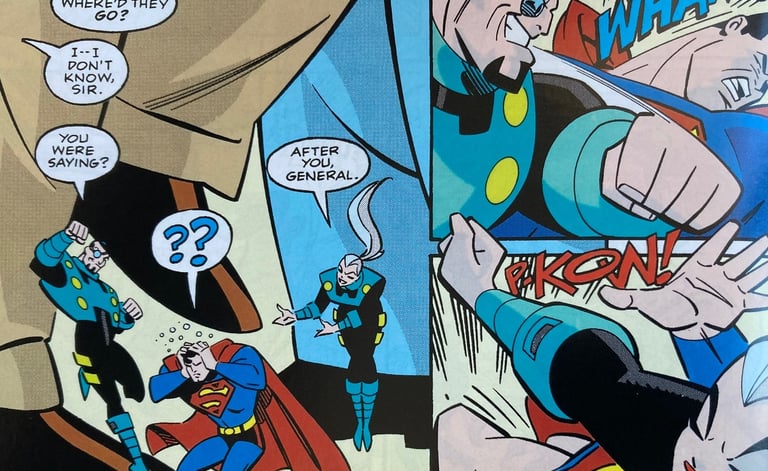

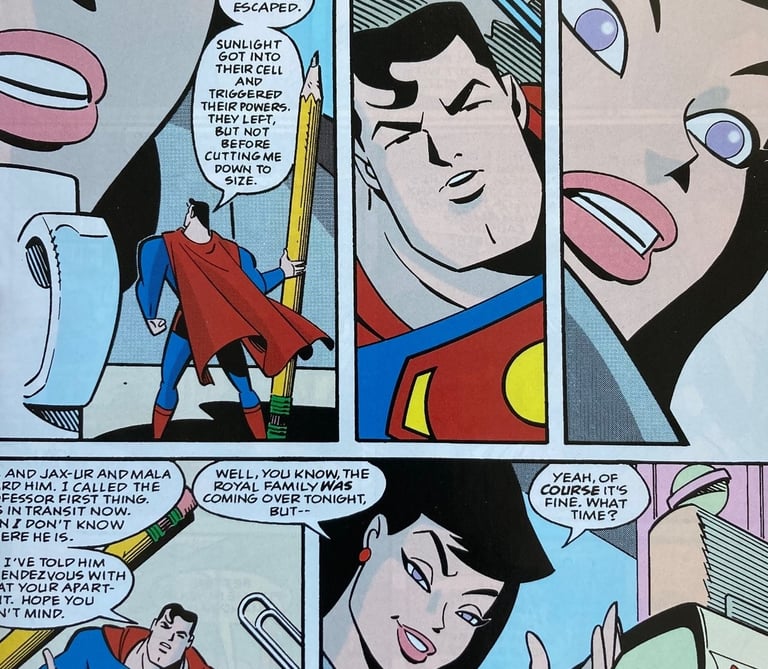

Burchett takes full advantage of Superman's predicament, depicting scenes of immense size and scale that truly resonate. Has there ever been a better "close-up" of Lois' lips peeling back across a deck of stunning, biting teeth?
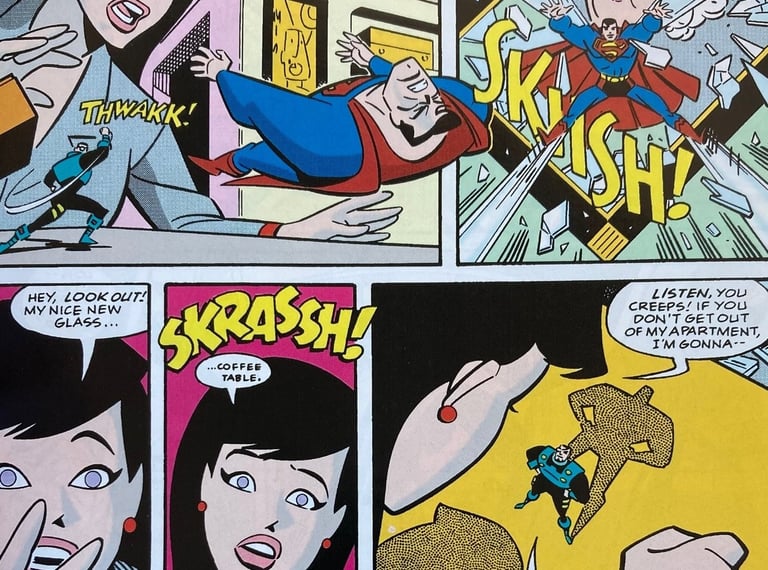

Moreover, Lois' expressions are hilarious, somehow making her more endearing here than in many of her more "serious" incarnations.


Superman Adventures #8 - All Creatures Great and Small, Part 2
Last ish, Superman had been shrunk to the size of a credit card while the villainous Jax-Ur, by use of the “Molecular Scaling Generator,” was now a monstrosity, marching amongst the skyscrapers like some Kryptonian Kaiju. If Superman was considered small before, he’s but a germ compared to the titan.
“You want to tell me what you’re going to do about this?” Lois asks.
“To be honest, this one has me a little stumped…,” comes Superman’s hesitant response.
Indeed, it’s an already impossible predicament made worse by Mala getting restored to her normal size and Jax-Ur swallowing the generator whole. What is a 4-inch Mighty Mou—er, Superman, to do?
Unfortunately, McCloud doesn’t seem to entirely know either—although he has some fun depicting the general’s initial rampage as he stomps toward Washington, D.C., his ultimate solution feels rushed and over-simplified. Decked in a protective, conveniently-devised suit, Superman flies down the giant’s gullet, retrieving the gobbled generator. And within the space of three panels, he flies back out, somehow opens the case and reconfigures the contraption while still midair, then zaps both Jax-Ur and Mala with a single blast—all while still tiny himself, and all while his Kryptonian foes know what he’s trying to do.
It’s a sloppy conclusion when a cleaner answer was probably available—why not have Supes slip into Jax-Ur’s body without being seen, then zap him from the inside? Or, why not go full silver-age crazy and have Superman zap himself first, growing as tall as the general in what could have been an epic “Ultraman-style” showdown?
But for what the writing might lack, the art is still great—Burchett once again uses the wacky premise to his advantage, producing uniquely expressive art with characters splayed in all kinds of atypical poses. Ever want to see Lois caught by the cuff of her jacket by a toy-sized Superman while flailing through the air? It’s definitely not the graceful rescue she usually receives, nor what readers expect to see.
And that’s the beauty of the story, and really, the entire series. Even when the outcome is dumb, it always offers something both creative and entertaining.--D
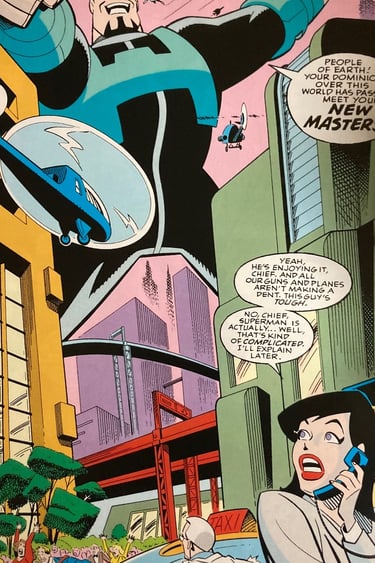

Jax-Ur is now a veritable King Kong. Fortunately, in his super-size, he never bothers to take flight, preferring a destructive stroll toward Washington.
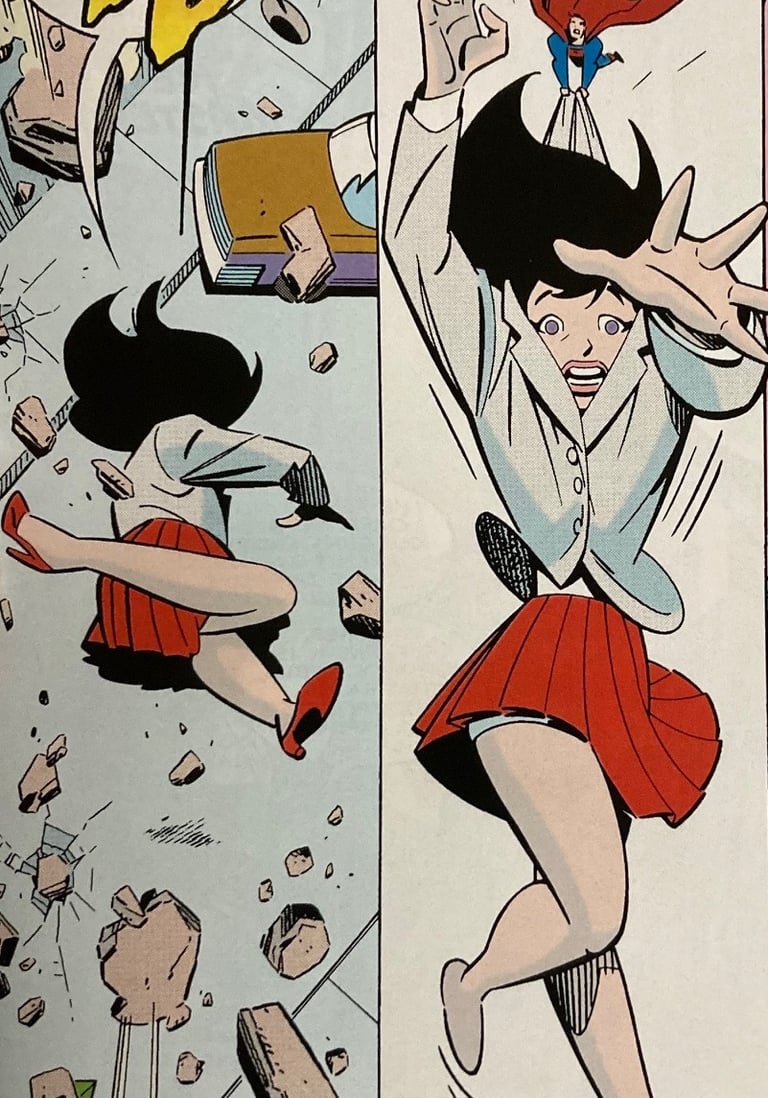

If the story is silly, at least it gives Burchett a chance to have some fun. Here, a teeny Superman struggles to hold the woman he once so easily cradled in his arms.
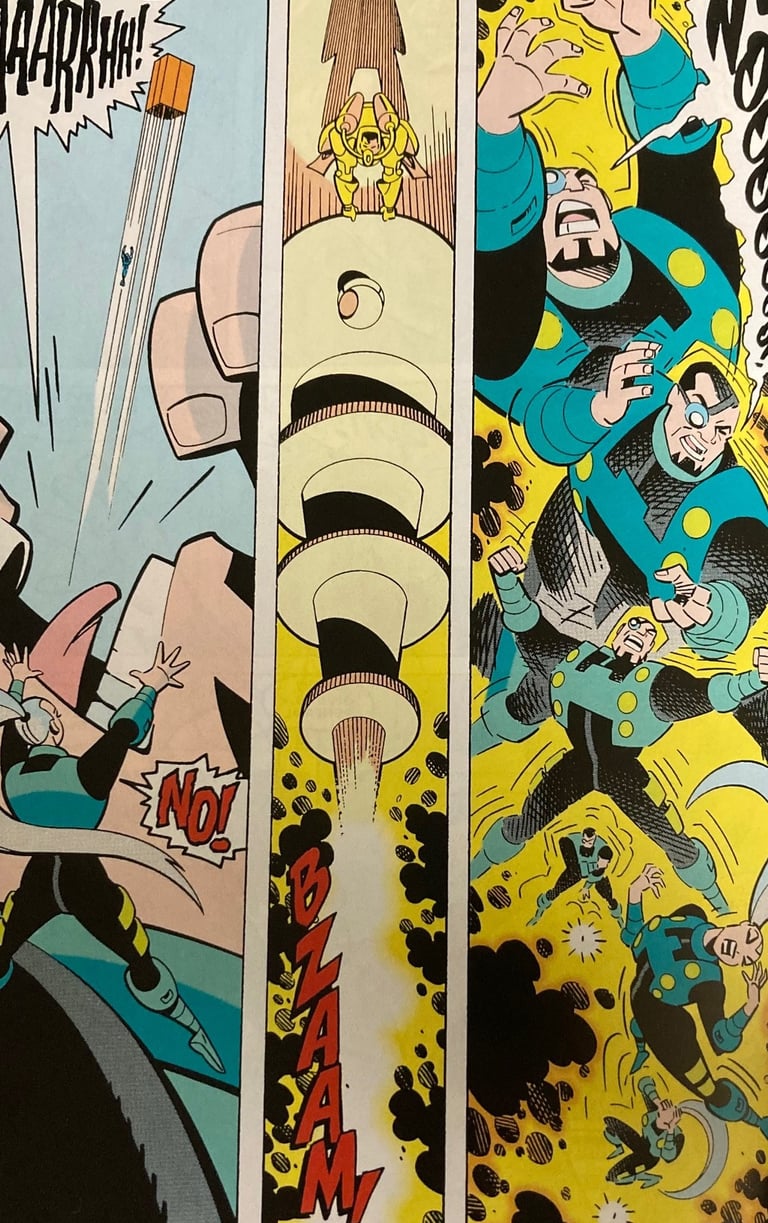

The ending, essentially, in three quick panels. Superman, even when dinky, knows how to multitask.


Superman Adventures #9 - Return of the Hero
After taking some wacky detours into the weird and surreal, McCloud regrounds the series in this somber and somewhat philosophical parable “Return of the Hero.” Here, a teen named Francisco idolizes two men—the noble Superman and, in Frank’s eyes at least, the equally impressive Lex Luthor. The former is easy for him to admire, of course, but being a poor teen living in the “Suicide Slum” side of Metropolis, he’s especially keen on the latter. Indeed, Luthor himself once lived in the same derelict district, only to rise, in time, to become the self-made billionaire everyone knows. The boy hopes to emulate the same.
The one man Frank doesn’t respect, however, is his own father, who was arrested for embezzlement charges and later died in prison. He was innocent, of course, framed by Luthor after he reported on Lexcorp’s illegal dealings. But Frank doesn’t know this…doesn’t want to know this. The rest of the story follows his slow journey to the truth, one in which he’ll lose one hero but gain another.
It’s a story of reckoning and reconciliation, of heroes and villains and son versus father, but McCloud uses those themes to delve ever further, using the three figureheads to wax poetic on just what does make a man heroic. Normal men (and women) can do super deeds, sure, but even bad men can possess qualities of admiration. Heroism, it seems, means more when it comes from the flawed versus the flawless.
This is not a flashy story of action or humor. It’s a more meandering, more contemplative exercise…a nuanced examination of morality and countervailing creeds. Superman views his station one way; Luthor, by means of an almost fatherly lecture he gives to Frank, reveals a very different worldview. The alien sees privilege as a gift; the human sees it as a means for opportunity…and exploitation. In Luthor’s mind, he’s done no wrong, for he’s transcended society’s arbitrary rules and now enforces his own. It’s a character study that probably aligns with many of the corrupt leaders and politicians at work in the real world today.
McCloud is a masterful storyteller, able to switch from Silver-Age silliness to gritty, modern-day realism so handedly, so effortlessly, from issue to issue. On one side, he provides escape from the grim trappings of reality. And on the other, he explains why real people sometimes do really bad things.--D
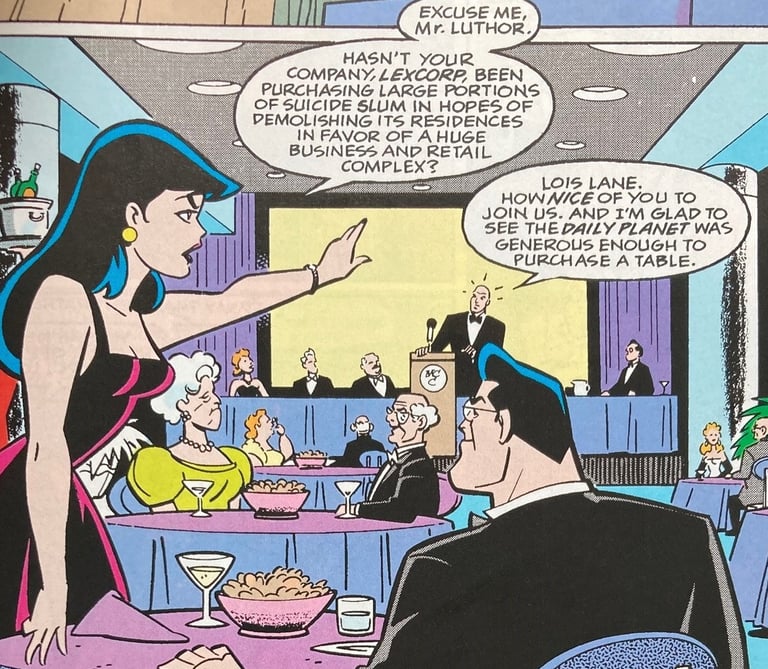

Lois, in her way, is as heroic as anyone.
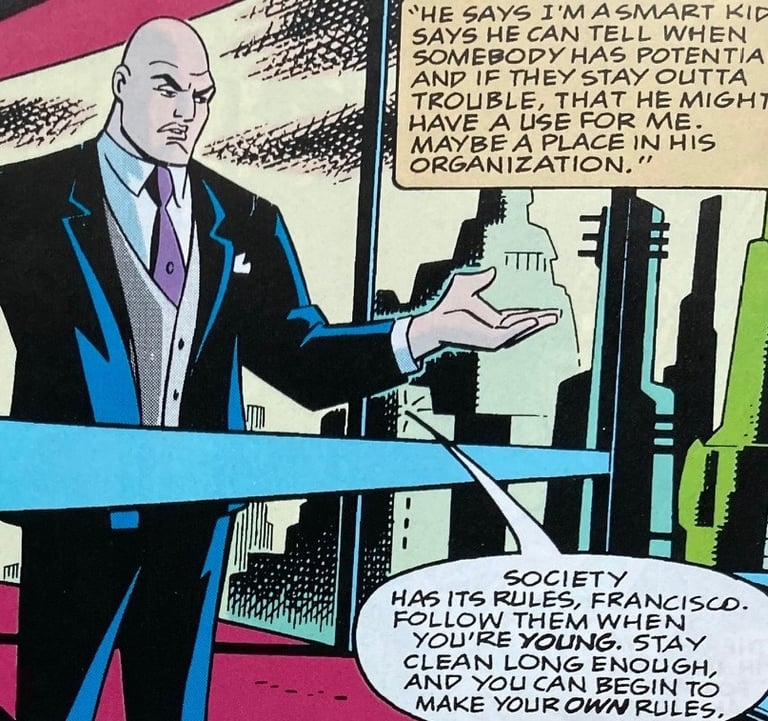

Luthor reveals his own moral code, which is to say, he makes his up as he goes.
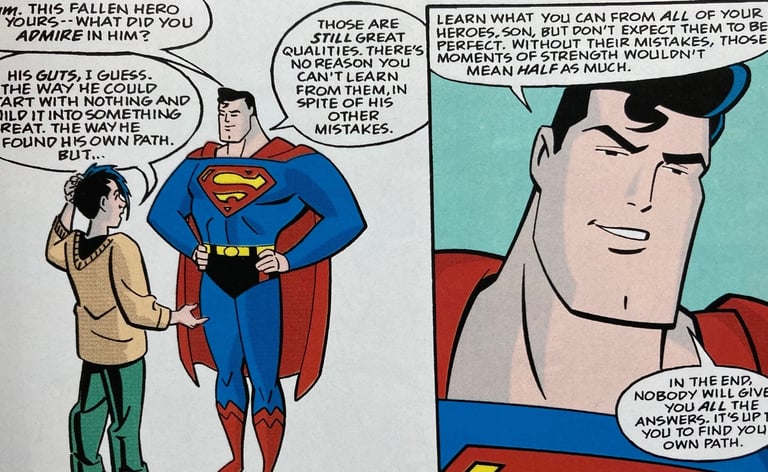

Superman gives some sage advice regarding flawed men with heroic qualities. It's like the old saying: One should never go to know his hero (or something like that).


Superman Adventures #10 - Don't Try This at Home!
Volume One ends on a whimsical little caper. In the span of a single night, Metropolis has been swept by a wave of petty, inexplicable thefts. Thousands of small but valuable treasures—cash, jewelry, small antiques—have vanished from people’s homes. Even Superman is stumped until a young girl shares her theory: she thinks the tiny superman figurines being sold across the city are somehow involved. And Clark, examining one of the decidedly unlicensed toys, gets to thinking.
Early the next morning, Superman waits as a sudden swarm of tiny men begin flying past. Supes follows the flock back to an Acme factory where the mini-Supermen are dropping their stolen swag into one million-dollar dump. And there, the mischievous Toyman waits, anxious to unleash several more of his mechanical creations. As Supes fights, the villain prepares his ultimate toy—a life-sized Superman duplicate that’s programmed to attack Stryker Island Penitentiary. The idea, so Toyman hopes, is to fool the public into believing the hero has gone rogue. Of course, Superman quickly dispatches the marauding toys, then successfully apprehends his doppelganger attacking the prison. It’s not clear, really, what Toyman ever really hoped to achieve.
Nevertheless, what the story lacks in a credible threat, it makes up for through pure, zany creativity. The little Supermen stealing baubles from peoples’ homes is an excellent gimmick, and Tasha, the girl who gives Clark his important tip, grants him the chance to outscoop Lois, the usual investigative superstar. Many forget that the two, when it comes to getting the story, are as much competitors as they are partners, which makes this win especially delicious. Clark, so often lost in his own Superman shadow, rarely enjoys such a double triumph.
Although not a super conclusion to Volume One’s overall collection of excellence, it’s an indubitably suitable one—a tall tale that skips the cynicism and provides what readers, at the time, had come to expect from the character. Good stories, great interactions, impossible scenarios…all combining to create the perfect escape from the real, imperfect world.
McCloud, Burchett, and their super team forged what even the animated series couldn’t always do—make Superman personable. Less a Boy Scout, less than a superhero…he’s more a super friend.--D
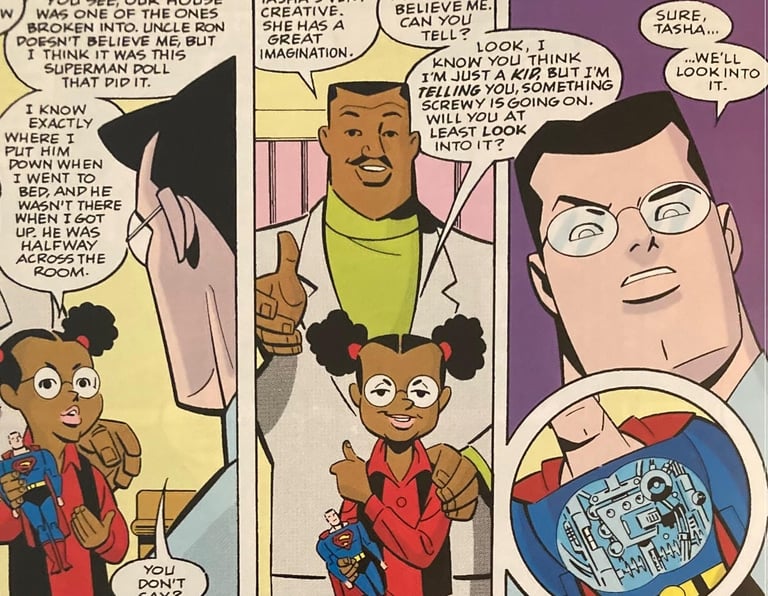

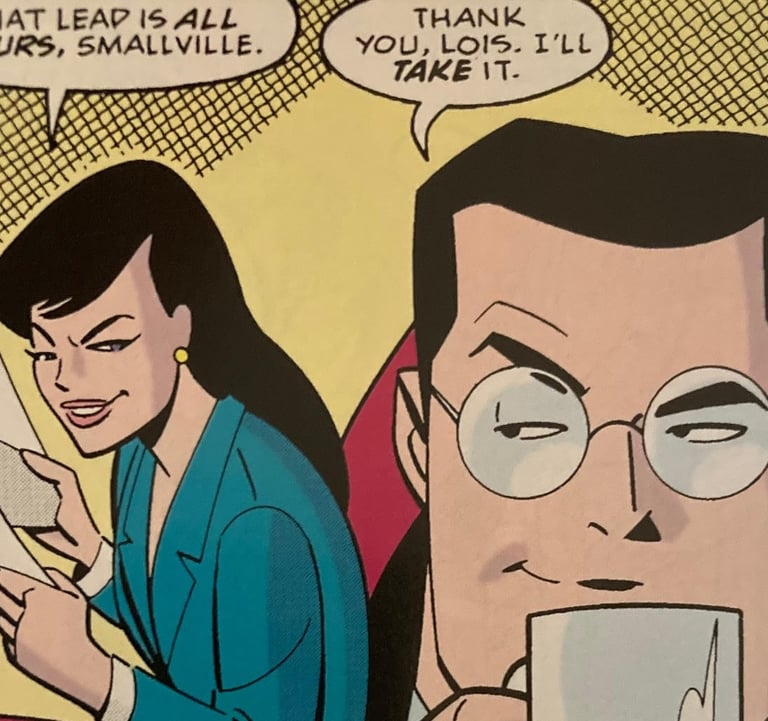

Thanks to young Tasha, Clark gets the tip he needs, much to Lois' later dismay.
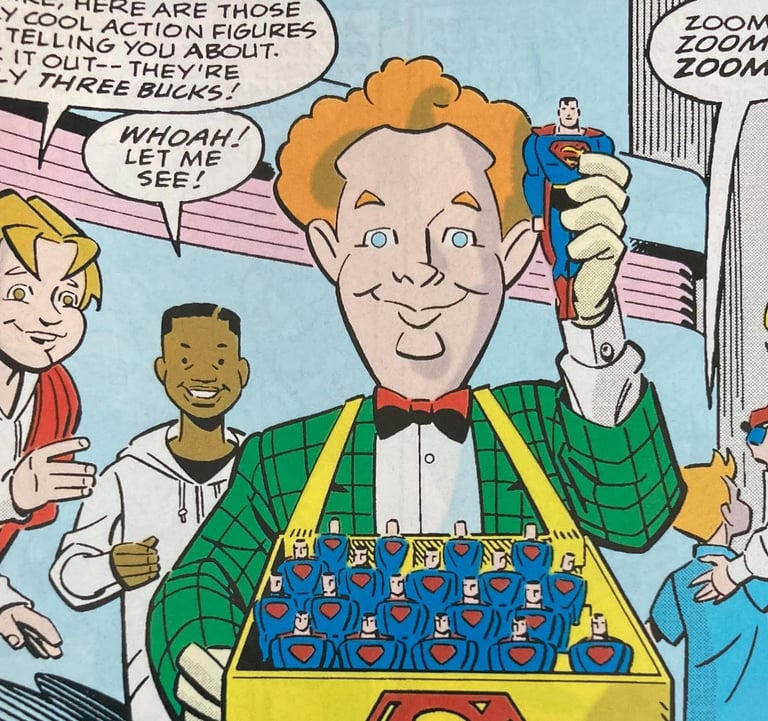

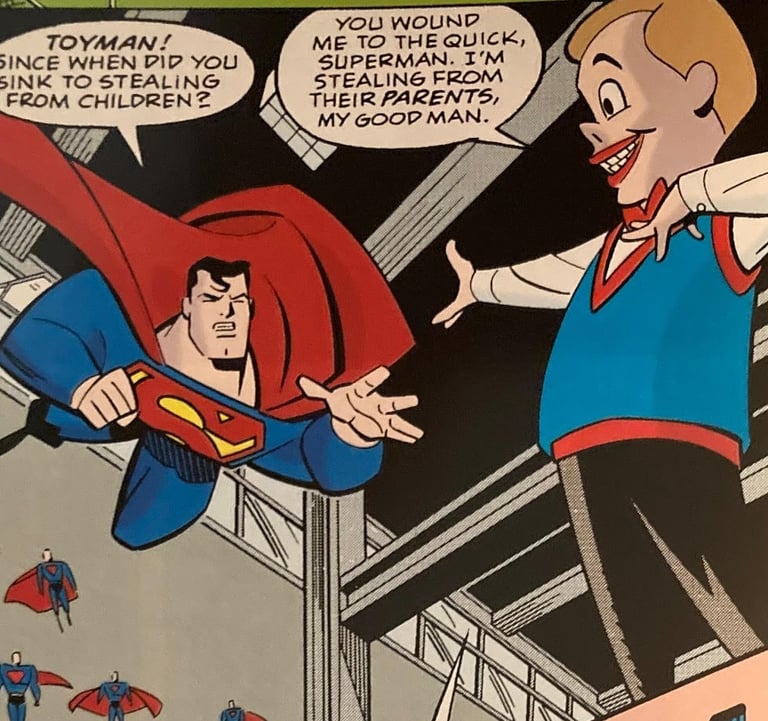

The (robotic) vendor seen peddling the tiny Supermen is actually a rough composite of Toyman's appearance in other continuities. In Superman Adventures, however, he shares the creepiness of a devious ventriloquist dummy.
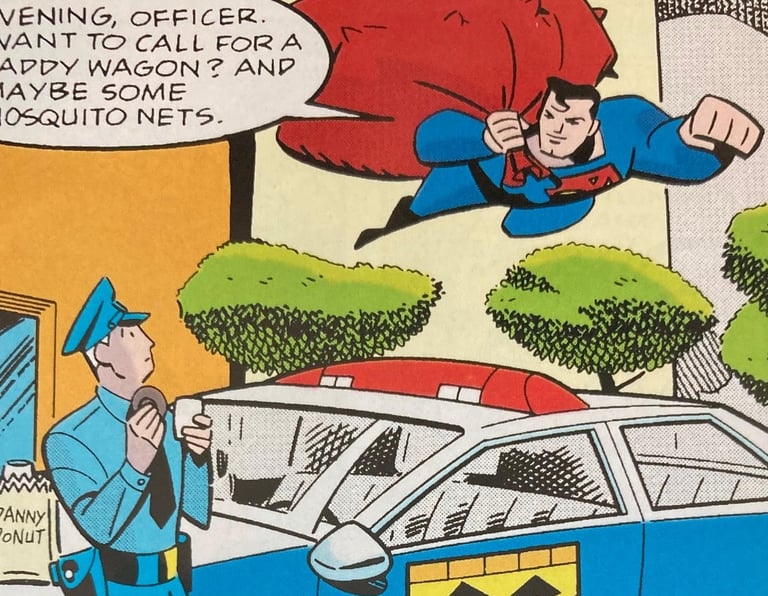

Superman using his cape to round up the toys is a cute, single-frame detail most won't even notice.





